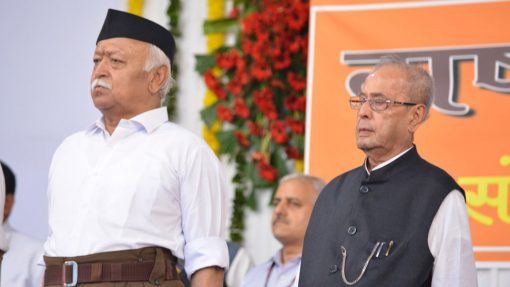
Pranab Mukherjee, the former president of India and a Congressman, was the chief guest at a valedictory function of the ‘Sangh Shiksha Varg’ of the Rashtriya Swayamsevak Sangh (RSS). The event was held at the RSS headquarters in Nagpur on June 7. The fact that a Congressman, a former president and a critic of the Hindu fundamentalist organisation was to participate in this function got the media to focus entirely on this event.
When the news of Mukherjee’s acceptance of the invitation from the RSS was out, the media woke up to perform a series of analysis of this decision of the former president. The Indian National Congress (INC) also came in the spotlight. Various speculations ranging from why Mukherjee accepted the invitation, to why RSS invited Mukherjee in the first place were doing rounds. Post the event, Mukherjee’s speech has become the centre of discussion. The INC members seem to be very happy about the former president lecturing the gathering of RSS members, followers, and patrons about nation, nationalism, and patriotism.
Sitting back and watching the live telecast of the entire event that brought the ways and functioning of the RSS on the screen, Pranab Mukherjee’s speech seemed to be a futile exercise, and a publicity of communal forces like the RSS.
Many argued that Pranab Mukherjee’s acceptance of the invitation from the RSS and the gesture made by a Congressman towards the RSS was a ray of hope for the initiation of a dialogue. Such an argument comes from misreading the RSS and its project; such an argument is possible when one assumes that a dialogue with the RSS is possible and can be fruitful. RSS, the fundamentalist organisation stands firm on the ideas of the Hindu Rashtra and Hindutva that were propagated by Keshav Baliram Hedgewar, its founder, and Vinayak Damodar Savarkar, its ideologue. RSS is an organisation which functions as definition makers and not definition takers. Mukherjee speaking to RSS has not and would never open up avenues for a dialogue.
Mohan Bhagwat, the chief of RSS had once said, “Germany belongs to Germans, England to English, America to the Americans, and Hindustan to the Hindus.” He had stated this as a matter of fact. This is the core ideology of his organisation. However, the speech delivered by Bhagwat, just before Mukherjee, presented a new story. The entire nation watched and heard Bhagwat praising India for its pluralism. This is the strategy that the Sanghparivar has resorted to, to get rid of its stains of communal violence and the widespread intolerance in the country now. It is trying to create an image of RSS as just a social organisation that believes in pluralism, and is tolerant.
The coming to power of Bharatiya Janata Party at the Centre in 2014 gave a legitimate space for its parent organisation RSS in the country. RSS and its local outfits spread across the country are functioning openly as the torchbearers of Indian culture, Indian history, nationalism and patriotism. The involvement of the RSS in the governance of the central government is visible and is being widely critiqued. The upholding of India’s pluralism by Mohan Bhagwat should be seen in the context of these developments, and one should not forget what the organisation actually believes.
RSS actually believes that India’s glory ended after it was invaded – beginning in the 8th century – by Muslims and then Christians, who converted the Hindu inhabitants. They also argue that if all Indians were to acknowledge and accept that ancient Hindu identity as theirs, it would unify the country, offer the best defiance against any future aggressors, and head off separatist movements.
M S Golwalkar, the longest serving RSS supremo, defined the dream of the Hindu Rashtra in his book We – Or Our Nationhood Defined. According to him,“In this country, Hindusthan, the Hindu Race with its Hindu Religion, Hindu Culture, and Hindu Language (the natural family of Sanskrit and her off-springs), complete the Nation concept: that, in fine, in Hindusthan exists and must needs exist the ancient Hindu nation and nought else but the Hindu Nation. All those not belonging to the national i.e. Hindu Race, Religion, Culture and Language, naturally fall out of the pale of real ‘National’ life.”
The RSS is striving to realise this dream. If one has to argue that Pranab Mukherjee’s speech last evening, brought two radically opposite ideologies in a dialogue, it is to overlook both the history and the current political forms and functions of the RSS. If at all Mukherjee’s visit has done something, it is nothing but giving credibility to the RSS.
This valedictory event of the RSS was telecasted live by all the major television channels. This has given the RSS and BJP the publicity they had desired, just before the much awaited 2019 election.In fact now even the RSS has gained credibility to openly function in the public domain. The RSS used to be involved – and still does greatly – in the campaigning for the BJP during elections. As they are also are involved in “exchange of ideas” with the policymakers. RSS was craving for this publicity, and it has clearly accomplished that.
Pranab Mukherjee’s speech is being called a “mirror of truth” to RSS and the Congress members are rejoicing it. However, even amidst all this, we must not forget that Rashtriya Swayam sevak Sangh only believes what it believes.
Also read:




